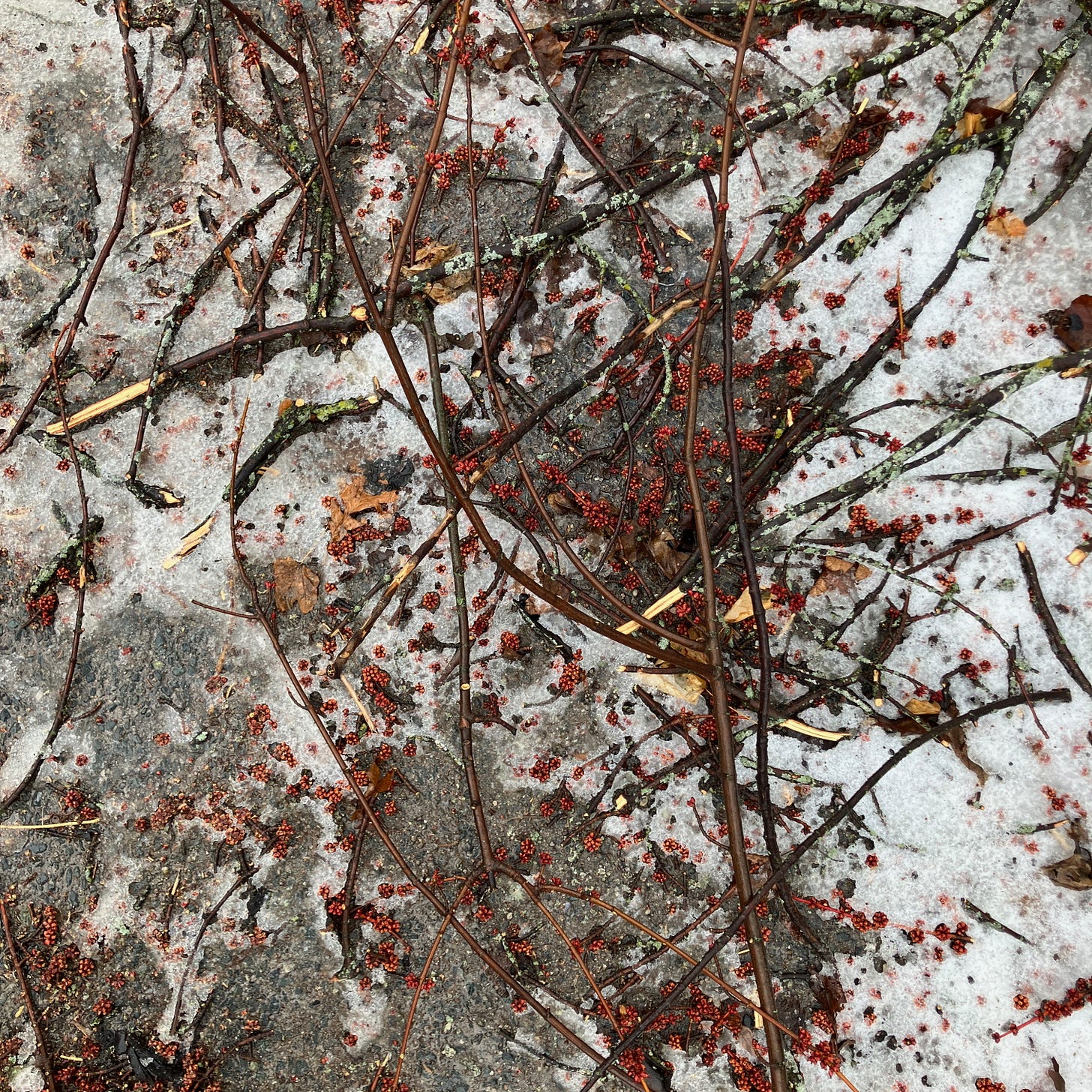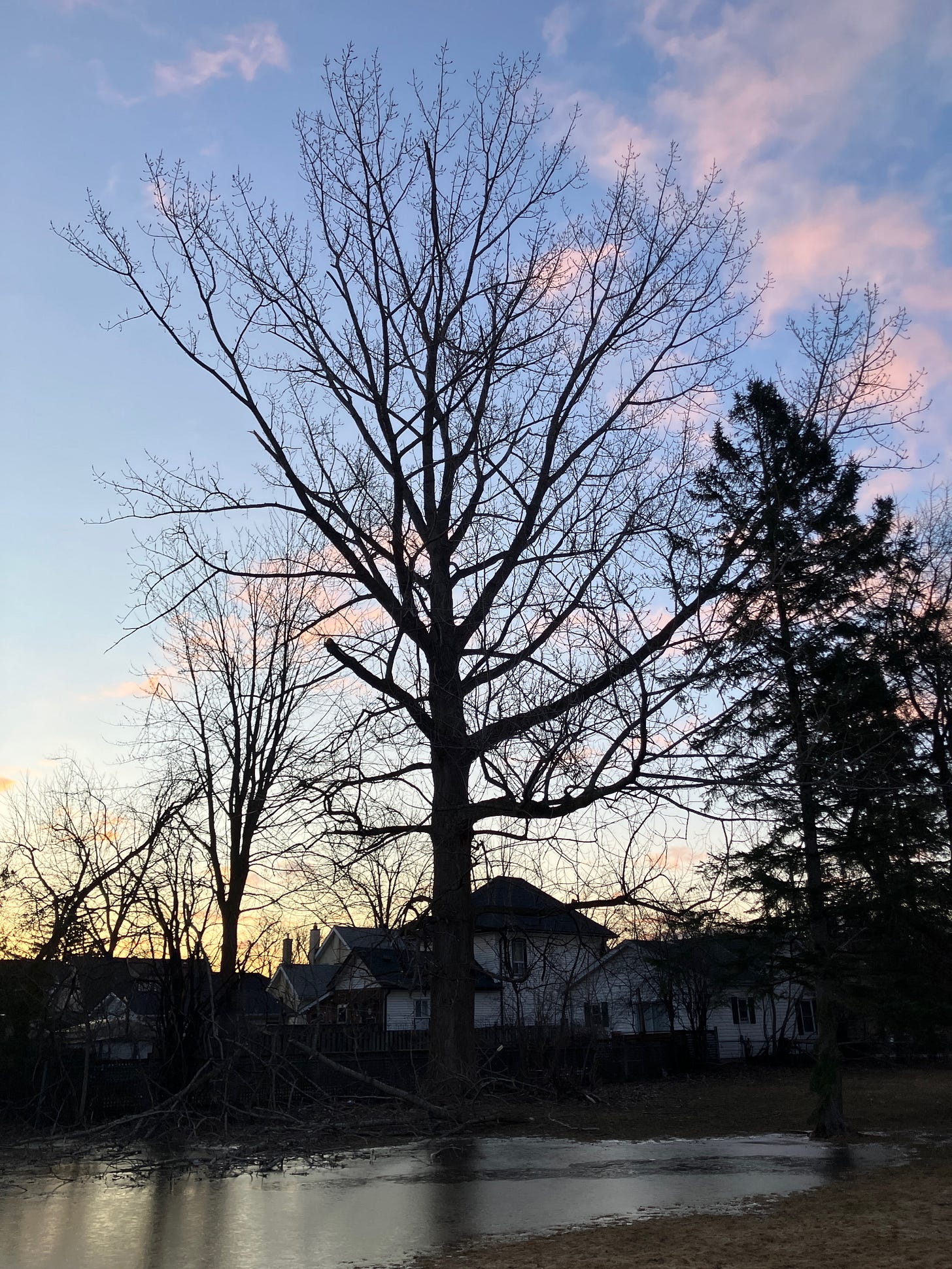Clip the ends of the branches of the apple tree to encourage profusion. Clip just beyond a node you think will send a shoot in a good direction. Clip the unruly, the dead, the snapped, the skyward, the groundward, the inward, the crowded. Clip to a height and a shape you can manage; consider your own height and reach. Clip just past the branch’s collar and don’t leave a stub. Envision scaffolding, shelves of a few or a handful of branches a foot to eighteen inches apart. Imagine a pyramid, a sparse, conical Christmas tree. If the tree sends up two leads, clip the one that seems to be growing more askew.
Still glove-and-toque weather, sunny and brisk, and the trees seem to be thriving, grown, none kicked apart by humans or girdled by rabbits over the winter, none collapsed from two full days of freezing rain. The last I had seen of these dozen charges was in the fall, giving them a good long drink before the ground froze, hiking the eighteen-litre water jug back and forth with the dog running the lengths alongside me.
I’m here before the others, recess erupting into the schoolyard, and soon I’m approached by two women half my age, high-vis vests and whistles on lanyards, asking why I’m here, doing their duty. They don’t seem to understand my answer. One of them brings me into the school to sign in and receive a visitor’s badge, shouting randomly all the way at nine-year-olds being unruly, being nasty to others for fun, a kid pushing another kid as he takes a drink from the fountain. She shouts to startle them, to overpower them. To curb unwanted behaviour.
I think of all my trips into old folks’ homes these past few years as I stand at the clipboard and write my name and the time of day into the boxes the woman at the desk behind me is charged with tending to. How we cordon off old and young. How angry, stunted those inside can grow. Kid pushes kid at fountain, trying to knock something loose. The carnage of branches I passed on my way here. The massive tree limbs lying along the edges of the schoolyard, decorated with Caution tape. I tell the woman at the desk, in case she’s garden-attuned, that a bunch of us are here to prune the fruit trees we’ve planted between the soccer pitches and she nods back blankly, a question mark. Mountain of downed scrub out the window behind her.
Grieving, alarmed on my walks around the neighbourhood in the days after the storm. Nearly every tree pruned by it. Huge mounds of brush and branches at the foot of each yard, as big as the piles of snow this winter. My scavenger’s sensibility, inherited, kicks in: What to do with all these slender branches? How best to season firewood? Which wood is best for carving? Which long branches for trellises? I would be awash, overwhelmed. I pick some small arms of magnolia off the road one morning. Mementos.
We’ve all stacked up the fallen and the city will truck it away. They’re saying now they should be done mid-June. I watched the two humans and the Davey truck roll by the other day, feeding the piles into the chipper. High-vis vests. Protection for the eyes and ears and head.
On the Sunday, a chorus of limbs cracking, breaking off, thundering to the ground. By Monday, all the ice was gone. On Tuesday it was almost summer-like. The pendulum-swing of the turning season, the turbulence of hot and cold air mingling, grown extreme, catastrophic. The lanterns are out on the tables and there’s cash in the teapot. I’ve started the tomatoes and the first round of greens.
A certain type of break: more of a peeling away, long stripe of heartwood exposed, with the bright plumbing of years encasing it. Boughs of cedar and pine. Vast scribbles of Norway maple obscuring the election signs. The thin alarm of birch splayed every which way. The arm of the poplar in the park, my axis, and now I’m wondering if it’s actually a cottonwood. Hearing a story about thirty-foot ironwoods positioned around a house, how they bent right to the ground as the ice collected on them, then straightened up again as it melted, largely unscathed.
Recovery is slow. We as a species are slow at it. Destruction is an instant.
We watch minutely, obsessively. The frequency of storms increases.
One of the people who taught me to prune, one of our small troop of volunteers, strikes the only note of optimism I’ve yet heard, says, “I think you’ll be surprised how resilient trees can be.”
The city will once again tally up and tell us how many we’ve lost. Amid this damage, I’m so curious to see, this summer, what will grow.







401078 It was alot more enjoyable to read about pruning than it was to live through the downed power lines and to see the devastation. Thanks for this insight. thanks for the great photos. Let's hope for growth in the summer.
The branches stacked on most curbs